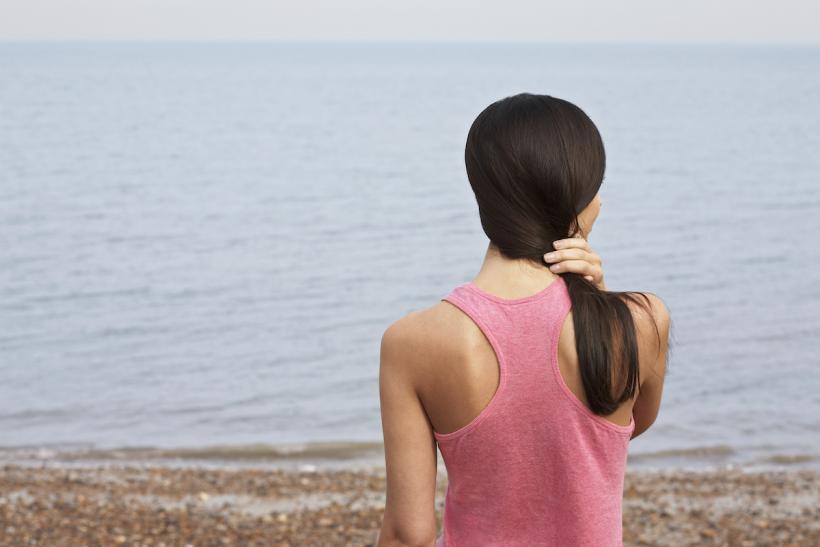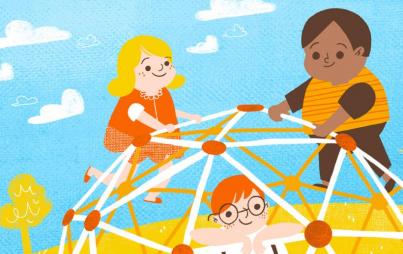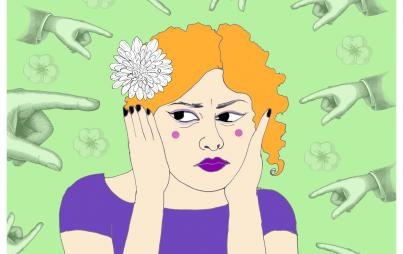
“"Have a burger for God’s sake,” “You’re a twig,” “Are you anorexic?”
It never fails. I am always the skinniest girl in the room. I know I am an anomaly. And I know, in this misguided society in which we live, being born naturally thin is like being born rich. It’s as if I have it all — and I did nothing to earn it.
I’ve gone back and forth about writing this piece, about saying these words out loud.
I don’t want to come off as shallow or judgmental, as angry or entitled. Or as someone who pays too much attention to body image, because that is exactly what I’m trying to discourage.
But it just keeps happening.
At a party last week, while sitting down to dinner with people I just met, I asked my boyfriend, Alan, to hand me the garlic stick he hadn’t finished. He was sitting at the other end. I had already eaten two large garlic sticks and a plate full of pasta drenched in sauce and buttery mashed potatoes. He passed me the greasy piece of bread.
Someone commented, “You are so lucky that you can eat so much and be so skinny.”
The other partygoers concurred. From the perspective of everyone sitting at the table, they were paying me a compliment. And I genuinely liked my new acquaintances. Except I was not seeing them like they were seeing me. I was not focusing on their hair, their skin, and certainly not their body weight. I was not keeping an eye on their plates or monitoring how much they eat.
I’m not claiming to be so high and mighty that I didn’t notice how they looked at all. But the bulk of my consciousness was somewhere else. I was thinking about what we were talking about — our respective creative fields and what was fascinating about them. I couldn’t help but feel a sense of shame when my weight was addressed publicly, yet again. It jolted me out of the meaningful discussion we were having.
I replied with self-deprecation, partly to swerve the conversation, and partly out of a habit — unpleasant as it may be — of responding with a negative to balance the positive. People often tell me I can’t take a compliment, which may be a significant source of my so-called problem with being called too thin.
“I may be lucky to be skinny, but my teeth are horrible,” I said.
They laughed. The topic shifted to all-natural dental products that might spare me future trips to the dentist, which conjured a new worry for me — did they think I am bulimic? Because bulimics have terrible teeth. I considered working in my pathological fear of throwing up to dispel the suspicion that I might have an eating disorder. Because I am the skinniest girl in the room, these are the things that go through my head.
But for those who choose to believe that because I am small, I am not enough —body shaming is body shaming, whether it’s someone calling someone overweight or underweight.
How skinny? I am 34-years-old, 5’5,” and weigh 107 pounds. People commonly mistake me for a teenager. My weight has never fluctuated. Except for the time I went through a devastating heartbreak at 28-years-old and hovered at 100 pounds. After about two months, I was back to my equilibrium physically, but not quite emotionally. That took longer.
I don’t care about my weight. But other people do.
I know we live in a culture where women feel pressure to be thin. That’s where we are now — but not so long ago, fuller figured women were considered to be aesthetically superior. And skinny girls were not.
Why does there have to be a standard of physical beauty, of what a perfect body weight should be? Why can’t every form and shape be beautiful? I know I am not the first to ask this question. But why are we so far from finding an answer?
I try to imagine what it’s like to be overweight, to strive to be skinny. I know I can never really understand. I know I can’t. And I can surmise that the people who see every day as a struggle to pare down their figure will feel angry with me. Probably infuriated. Perhaps to them, I am reacting incorrectly. To them, I am feeling shame at the very words they would interpret as compliments. And I know it’s human nature to notice other people’s distinct physical attributes — whether it’s sparkling blue eyes, towering height, or twig-like limbs.
It’s the pointing it out that gets to me.
I am inherently lucky. I know I am. I don’t need to exercise multiple days a week. I don’t have to agonize over counting calories. For sure, I’d rather be too thin instead of weighing too much. My struggle does not compare with theirs. When I want to eat brie, I eat brie. If I’m passing by the 24-hour donut place, I’ll order a Nutella cronut. I can see how this might make someone angry.
Still, I wish that people didn’t have something to say about it, so often. I’ve been out to dinner, and the waitress has said, in front of a table of new friends, clearing up every plate but mine, “You’re a tiny thing. I’ll leave your food longer because you need to eat. You need some meat on those bones.”
I’ve gone to a yoga class, space allegedly free of judgment, and someone commented, “She’s too skinny.”
The teacher immediately retorted, “Never comment on body image.”
In grade school, my classmates called me “Bones.” In high school, another slight friend and I dubbed ourselves co-presidents of the “sickeningly thin club” to diffuse the steady remarks coming from a few mean-spirited peers who called us flimsy.
When I moved to L.A. and saw a new general doctor, he asked me twice if I’ve struggled with eating disorders, staring at me with a skeptical eye. I defensively showed him photos of my family, skinny like me. “See? Genetics,” I said.
Last week, I rode in an Uber, and for the entire 20-minute ride, the driver asked me personal questions about my eating habits, exercise, if I am on diet pills (I am not). She was determined to find out what my secret is. In college, boys have said, “I’m afraid to touch you because I might break you.”
When I feel frustration welling up in me, I stop and think: these people clearly aren’t thinking. Whatever insecurities they may have about their weight, whatever ridiculous cultural standards have been imposed on them — which is probably the underlying source of their struggle — has nothing to do with me. I try not to let it affect me.
But it stings. I don’t have control over the build of my body, nor do most people, regardless of variations in shape and size.
When random people tell me: “Have a burger for God’s sake,” “You’re a twig,” “Are you anorexic?” or “You’re so little!" — I try to remember that I am comfortable as I am. I know I am genuinely lucky.
But still.
What are the implications of their words if I really thought about them? That I am not a fully-realized person? That I never will be one? That because I am naturally lacking in body fat, I am lacking in something, perhaps a particular fullness? Maybe happiness? That I am not an adult, not a woman, not a person? Until I measure up to girls whose bra size is bigger than 32A?
In grade school and high school, people stopped commenting on my weight when I focused on something unrelated to it — what my mind and heart could do — like singing and writing. I leaned into my passions, which are not a product of my body image. I still do today.
But sometimes, even when I do that, I feel like others are judging, even if not out loud. I identify myself primarily as a writer. It’s what I do for a living. When I learned about a Los Angeles literary event where I’d be able to meet some of my favorite authors, I couldn’t wait to attend. And everyone was warm to me. But when I first walked in to the room full of women writers and didn’t know anyone, in the buzz of the crowd, I thought I heard them thinking — She’s the skinniest girl in the room.
Even if it was all in my head, my anxiety was real. Would they take me seriously as a writer with a compelling voice? Would they see me as someone who says important things? Would they want to talk to me, would they want me to talk to them? Or would they see me as a girl with skinny arms, exposed by my sleeveless dress? I wished I had brought a sweater.
I don’t know what they thought. And none of them commented on my weight. Instead, the discussions centered on buoying each other up. We encouraged each other’s projects, with no mention of diets or juice cleanses or fasts. Just like it should be. I still made a point to eat extra cupcakes.
I wish I didn’t have this impression of myself, built in me. I guess I have to work to undo it, to stop hearing what people keep saying.
(I just took a break to go to Trader Joe’s, and the man at checkout said my wrists were tinier than his nine-year-old daughter’s. Was that really necessary? On the way home, someone commented, “That bag of groceries is bigger than you. Need help?” I politely said, “no thanks.”)
I wish that everyone who sees me could see me like those who know me. Or that I could reply wittily and unaffected like my sister, who has answered for me in the past: “She’s skinny, but she’s freakishly strong.”
My longtime friends don’t talk about my weight. And I’m confident they no longer think of it. I never have to explain why I am the way I am. And when my boyfriend Alan realized he loved me, it wasn’t because I am skinny. It was because of our conversations, because he found me intelligent. It was because I write obsessively, because I study sitar, because I sing. What he saw in me was something bigger, something that could never be contained by a form as tiny as mine.
But for those who choose to believe that because I am small, I am not enough —body shaming is body shaming, whether it’s someone calling someone overweight or underweight.
When we see someone, the first thing we see should be a person’s unique spark, which has nothing to do with this temporary meat puppet that weighs on us more than our actual weight. Maybe we don’t have agency or autonomy to choose how we feel. We are so accustomed to being our bodies that it’s difficult to see beyond, to transcend what really has no relevance to the truth. But my body is not my spark. It’s something else.
Still, I’ve been denied a health insurance plan because a computer decided I am underweight. I’ve been denied acting parts because I look too much like a girl, not curvy like a woman. I’ve been denied respect because I don’t weigh as much as I “should.”
Since you are probably wondering, I do exercise. But I exercise lightly, and only because I need to get out of my head. It can be maddening being in my brain all day. I don’t overdo it. I go to Iyengar yoga once or twice a week to strengthen the muscles that support my spine because I have scoliosis, to better integrate my body and my mind and my consciousness so that I can understand all parts of myself a little better, to be a more present person, to quell my anxiety, and to hone a higher focus on my creative projects.
I don’t want to be identified with my body. I want to be identified with who I am, what I do, how I love.
When we meet each other, I want to comment on other things, to discuss more. I want deeper connections — like what I have with Alan and my real friends.
Here’s how they see me:
There’s a fire ablaze within that makes me love music, words, philosophy. I have an insatiable yearning to learn and do something more. To activate in others what I try to activate in myself — my best, most authentic and joyful version of me, courageous and inspired. To not be asleep in this body that I am not. To be the thing that is not that.
I can choose not to feel shame, and feel limited by what others say and see — just like anyone of any weight can do. It is in our power to not hear the “shoulds” other people say, not to see the “shoulds” other people see. I choose who I am, who I put forth.
Even though I am skinny, I am beautiful. I am more than the skinniest girl in the room.
I am the girl so full of promise, she’s brimming over.








